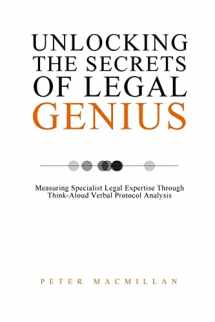
Unlocking the Secrets of Legal Genius: Measuring Specialist Legal Expertise Through Think-Aloud Verbal Protocol Analysis
ISBN-13:
9781518600975
ISBN-10:
1518600972
Edition:
1
Author:
Peter Macmillan
Publication date:
2015
Publisher:
CreateSpace Independent Publishing Platform
Format:
Paperback
326 pages
FREE US shipping
Book details
ISBN-13:
9781518600975
ISBN-10:
1518600972
Edition:
1
Author:
Peter Macmillan
Publication date:
2015
Publisher:
CreateSpace Independent Publishing Platform
Format:
Paperback
326 pages
Summary
Unlocking the Secrets of Legal Genius: Measuring Specialist Legal Expertise Through Think-Aloud Verbal Protocol Analysis (ISBN-13: 9781518600975 and ISBN-10: 1518600972), written by authors
Peter Macmillan, was published by CreateSpace Independent Publishing Platform in 2015.
With an overall rating of 4.5 stars, it's a notable title among other
books. You can easily purchase or rent Unlocking the Secrets of Legal Genius: Measuring Specialist Legal Expertise Through Think-Aloud Verbal Protocol Analysis (Paperback) from BooksRun,
along with many other new and used
books
and textbooks.
And, if you're looking to sell your copy, our current buyback offer is $0.3.
Description
Most of us have heard the phrase “To think like a lawyer.” But not many people really know how lawyers think. Even fewer know how expert lawyers think. Yet the tools needed to discover how lawyers assess legal risk and solve legal problems have been around for years. They’ve just never been adapted for this purpose ... until now. This book outlines an empirically-proven approach to investigating the unique characteristics of legal thinking – particularly the thinking of legal experts – through the use of experimental methods and techniques from the field of cognitive science. It describes in detail the processes of identifying appropriately qualified test subjects, ranking them according to their levels of likely expertise, engaging them with specially designed problem-based tests, and then analysing the resulting qualitative and quantitative data to identify distinguishing cognitive traits and behaviours.The findings presented by the author have the potential to materially improve the assessment methods used in lawyer accreditation schemes, change how clients assess the expertise of their legal advisers, increase the effectiveness of recruitment and in-house training programs within law firms, and lead to new approaches for the design and delivery of post-graduate education at law schools.


We would LOVE it if you could help us and other readers by reviewing the book
Book review

Congratulations! We have received your book review.
{user}
{createdAt}
by {truncated_author}


